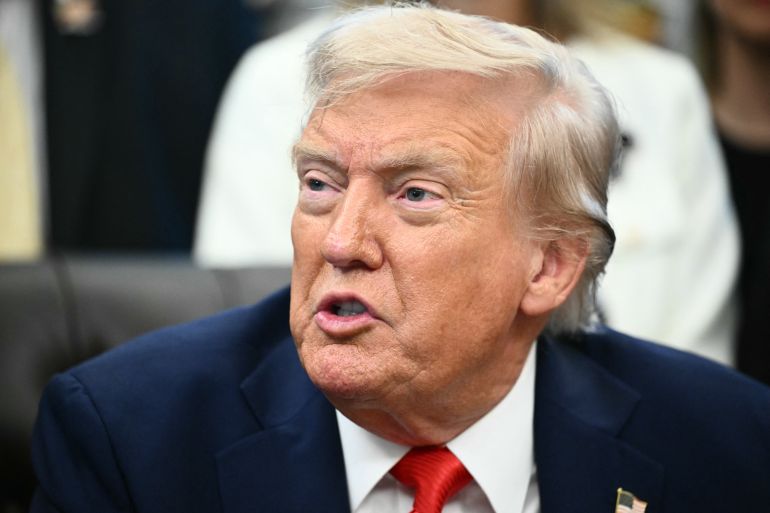Rwanda confirms it received seven immigrants deported under Donald Trump
The Trump administration has struck deals with third-party countries, including four in Africa, to accept US deportees.

Published On 28 Aug 202528 Aug 2025
Rwanda has announced it received seven people deported from the United States as part of President Donald Trump’s crackdown on immigration.
A Rwandan government spokesperson said on Thursday that the deportees arrived in mid-August, marking the first transfer in an agreement that might see as many as 250 people arrive in the central African country.
Recommended Stories
list of 3 itemsend of list
“Three of the individuals have expressed a desire to return to their home countries, while four wish to stay and build lives in Rwanda,” spokesperson Yolande Makolo said in a statement.
“Regardless of their specific needs, all of these individuals will receive appropriate support and protection from the Rwandan government.”
Makolo emphasised that the Rwandan government had “vetted” the deportees before their arrival.
They are currently being “accommodated by an international organisation” and would receive visits from local social services and the International Organization for Migration, a United Nations agency, she added.
Rwanda is the fourth African country to agree to receive deportations of non-citizens from the US, alongside Uganda, Eswatini and South Sudan.
The US has declined to comment on the recent deportation, and the identities of the seven individuals have not been publicly disclosed.
Deporting migrants and asylum seekers to so-called third countries, where they have no personal connection, has been a growing practice under President Trump.
Administration officials have argued that the tactic is necessary for migrants and asylum seekers who cannot be returned to their countries of origin.
Advertisement
But the practice has met stiff opposition from rights groups, who question whether deportees would be safe in the third countries Trump selected, many of which have poor human rights records.
Eswatini, for instance, is considered an absolute monarchy where dissent is not tolerated.
A government spokesperson there has already said the five deportees it received in July will be held in solitary confinement for a time in the country’s prisons.
A lawyer representing the five deportees, Sibusiso Nhlabatsi, has filed court papers saying he has been denied access to his clients. Rights groups have protested the deportations, and a court challenge is under way.
Immigration rights advocates have also argued that third-country deportations are unnecessarily cruel, as they condemn migrants and asylum seekers to life in a part of the world where they may not speak the language or understand the culture.
They also question the incarceration of the deportees in some of the third-party countries. Some have no criminal record, while others have already served their time behind bars and are subsequently reincarcerated.
Advocates in some of the third-party countries have also said the practice treats their homelands as a “dumping ground” for immigrants.
Earlier this month, seeming to anticipate some of the concerns about human rights, Makolo said that deportees to Rwanda would receive assistance, including “workforce training, healthcare and accommodation support to jumpstart their lives”.
Critics speculate that the Trump administration might be using third-country deportations to avoid scrutiny of the US’s own detention centres.
Trump campaigned for re-election in 2024 on the pledge to carry out a campaign of mass deportation, claiming that immigration to the US had become an “invasion” led by “criminals”.
The effort, he pledged, would constitute the “largest deportation operation” in US history.
Even before his inauguration, Trump and his allies had reportedly reached out to small countries like the Bahamas to accept non-citizen deportees. The Bahamas refused.
But shortly after taking office for a second term in January, Trump began sending migrants and asylum seekers to third-party countries like Panama and El Salvador, the latter of which housed hundreds of Venezuelan deportees in its Terrorism Confinement Centre (CECOT), which is notorious for human rights abuses.
Countries like Rwanda have also pitched themselves as alternative locations to receive deported migrants.
Yet, armed groups backed by Rwanda have themselves been accused of carrying out forced displacements and illegal deportations amid an ongoing armed conflict in the eastern regions of the Democratic Republic of Congo.
Advertisement
